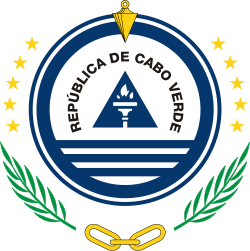| Prime Minister of the Republic of Cape Verde | |
|---|---|
| Primeiro-Ministro da República de Cabo Verde (Portuguese) | |
 | |
| Executive branch of the Government of Cape Verde | |
| Appointer | José Maria Neves, as President of Cape Verde |
| Inaugural holder | Pedro Pires |
| Formation | 8 July 1975 |
This article lists the prime ministers of Cape Verde , an island country in the Atlantic Ocean off the coast of West Africa, since the establishment of the office of prime minister in 1975. Pedro Pires was the first person to hold the office, taking effect on 8 July 1975. The incumbent is Ulisses Correia e Silva, having taken office on 22 April 2016.







